AURORA Mainnet to follow after the two-week testing phase
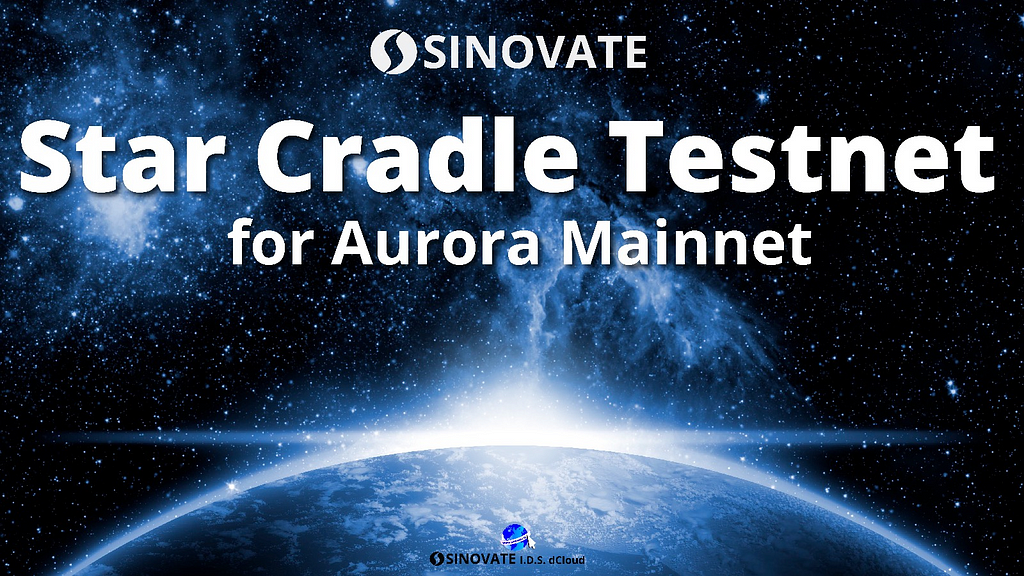
The SINOVATE (SIN) Star Cradle Public Testnet, which is the final stage before releasing the AURORA Mainnet, is now live. Testing will last for two weeks from September 18th, 2020 UTC 00:00 AM to October 2nd, 2020 UTC 00:00 AM, permitting Deterministic Infinity Nodes 1.0 (DIN) functionality to be experienced for the first time. The Star Cradle Testnet Wallet will be released shortly before the public testnet.
Why are you having a Public Testnet? Will this be incentivized?
The SINOVATE team has comprehensively tested the DIN codebase, and we are confident that all major bugs have been rectified. Despite this and in order to maintain our culture as a fully decentralized autonomous organization (DAO), we wanted to provide all community members with the opportunity to be rewarded for establishing any unknown bugs. Therefore, the idea of the SINOVATE Deterministic Infinity Nodes Bug Bounty was born. Up to $5000 (to be paid in SIN) will be available in incentives. In order to qualify, participants must submit a bug report in the format shown here.
Incorrectly formatted entries will not qualify for payment. Only valid bug reports will be paid, which must be submitted no later than October 2nd, 2020 UTC at 00:00 AM. Only InfinityNode, LockReward, and Metadata functionality related bugs are accepted. Please note that compensation amounts vary and depend on the severity of bugs and the quality of reports. Further bug bounty details will be published shortly.
What is DIN 1.0? What’s so special about it?
DIN 1.0 encompasses a multitude of advantages over the existing SINOVATE protocol. The legacy MasterNode system, which was inherited from DASH, will be removed to favor our custom in-house deterministic algorithm solution where rewards will always be equally distributed to node owners. On-chain rapid communication and blockchain synchronization will be enabled through our resource-friendly new wallet, requiring minimal CPU usage.
Furthermore, node setup will be substantially simplified to just a few short minutes, with the current config file, collateral deposit, and start alias needs no longer required. Schnorr MuSig signatures will now be used, which increases speed and scalability by magnitudes while minimizing blockchain bloat thanks to their reduced size. Removal of the 10k collateral requirement to start an infinity node will provide SIN coin holders with more funds for new nodes, trading, and holding purposes.
The SINOVATE team decided to implement MuSig signatures instead of alternatives such as BLS signatures, used by masternode projects such as Dash. Even though this method is the most common nowadays, speed and scalability are severely restricted and only permit a single signing session once in a while. Thus, it is deemed insufficient for future Incorruptible Data Storage (I.D.S.) decentralized cloud storage (dCloud) purposes.
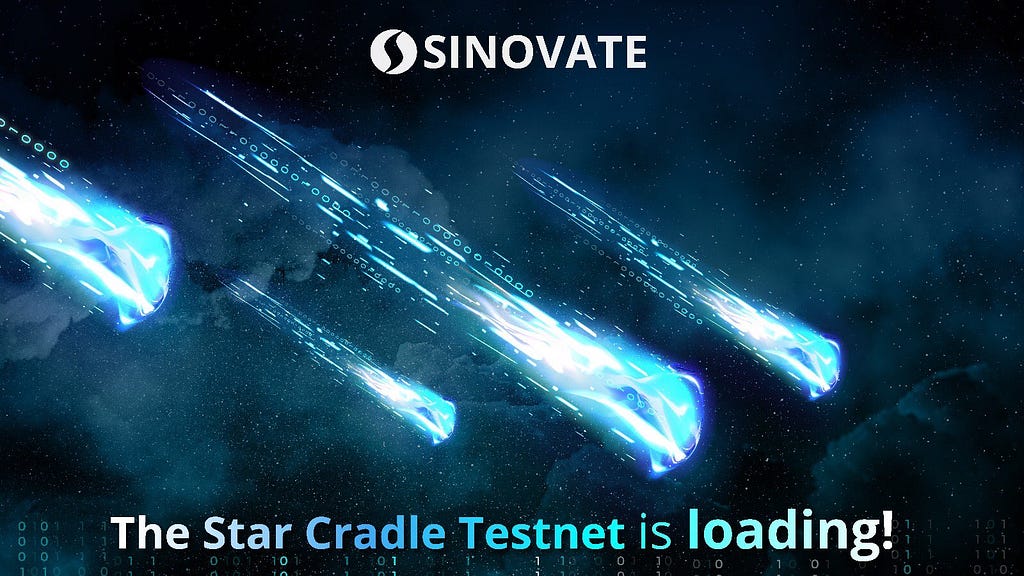
Sound good. What about chain-splits? What other benefits does DIN have?
Chain splits will become a thing of the past. The SINOVATE network will be substantially more stable, with downtime kept to a bare minimum due to the DIN codebase’s extremely secure nature. Once our upcoming I.D.S. dCloud storage solution is integrated, network security will reach elevated levels. This is because I.D.S. storage is dependent on the number of nodes joining and participating in the SINOVATE network, with a greater node count increasing decentralized cloud storage capabilities exponentially, creating an always rapid, exceptionally secure, scalable, and efficient platform for all.
IPv6 addresses have now been implemented, which allow extensive increases to addresses per network participant compared to IPv4. IPv4 addresses are in short supply globally, which will significantly depreciate the quality required for infinity node services, due to conflicts with replicated IP addresses. The Internet of Things (IoT) is causing a transition from IPv4 to IPv6, as the exponential multiplication of Internet-connected devices continues. This means that blockchains solely remaining on IPv4 risk being deprecated for future Internet purposes. Therefore, IPv6 adoption permits the SINOVATE network to stay ahead of the curve and adapt to changing needs as they occur.
Detailed node information will be viewable via the “My Peers DIN” tab as below:
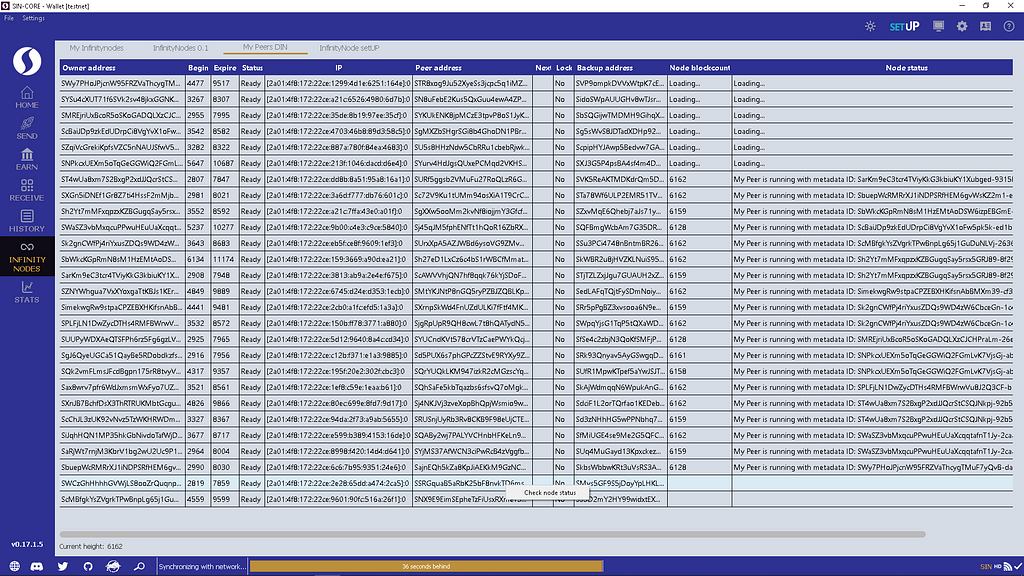
I don’t have any masternode experience but would like to host an Infinity Node. What’s the simplest way to do this?
Hosting an infinity node has become a whole lot easier through our in-wallet, one-click SINOVATE setUP cold hosting service. Setting up a node can prove to be a daunting prospect, especially with no previous experience of masternodes or the Linux operating system. With this in mind, the SINOVATE development team has designed a seamless and user-friendly VPS hosting service, which at only $3.99 per month (annual plan cost paid in SIN coins), provides cost-effective advantages over existing providers instantly.
How does SINOVATE setUP work? Is it really as simple as it sounds?
Please follow the below guide in order to set up a testnet Deterministic Infinity Node using the in-wallet SINOVATE setUP:
1.Upon opening your SINOVATE wallet, click the “setUP icon on upper right side”.
2. Enter your Email address and Password for the SINOVATE setUP cold hosting service. Click the “Create/Login” button to create your login credentials.
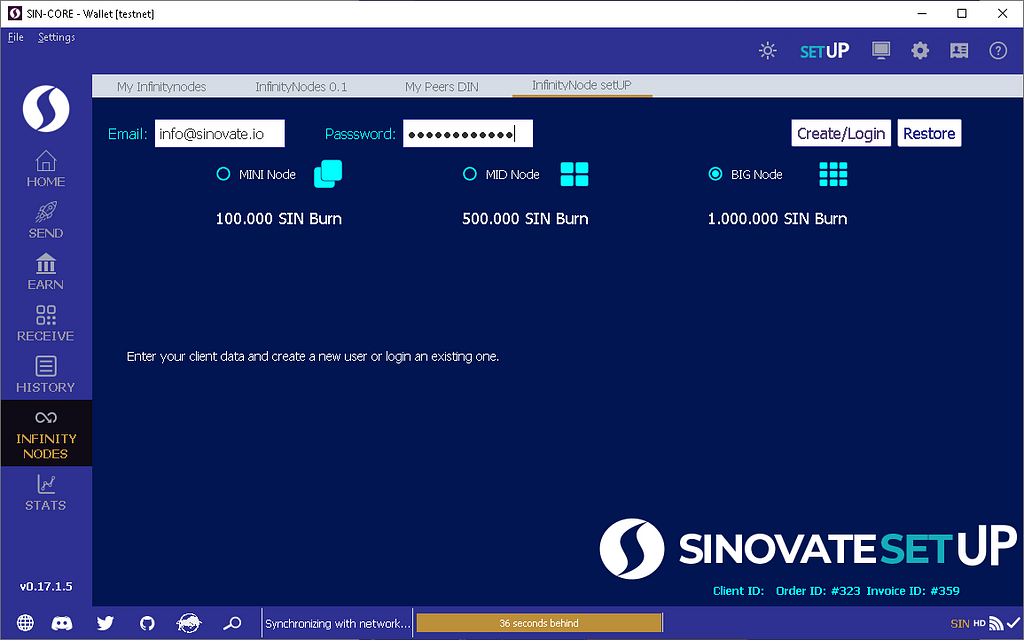
3. Select the “MINI Node” (100,000 SIN), “MID Node” (500,000 SIN), or “BIG Node” (1,000,000 SIN) circle, according to your desired level of investment. Participants can ensure that they have sufficient funds to set up a node by clicking “Check.”
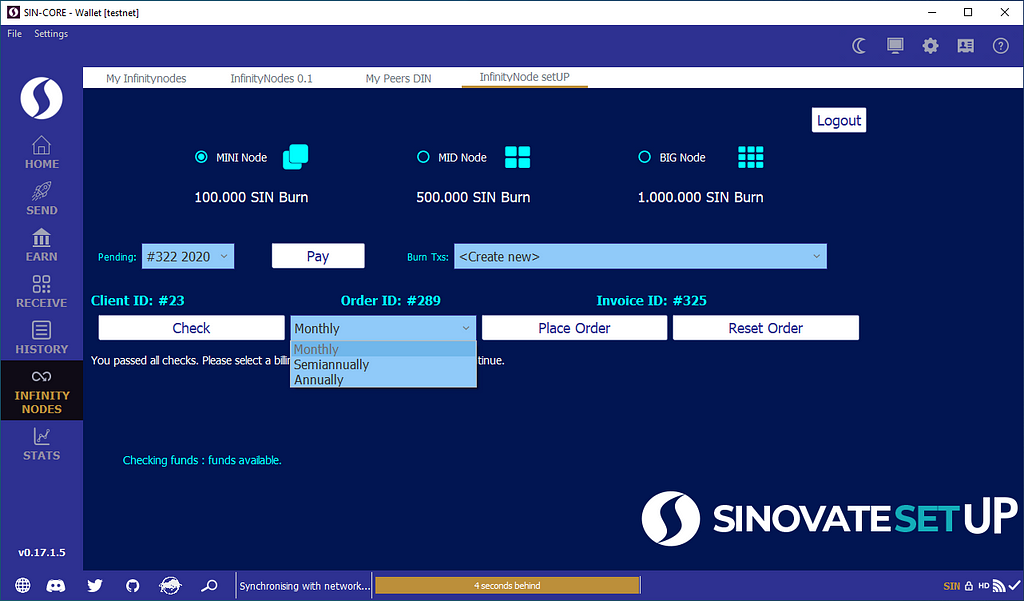
4. Once determined, select your preferred payment plan from the drop-down menu.
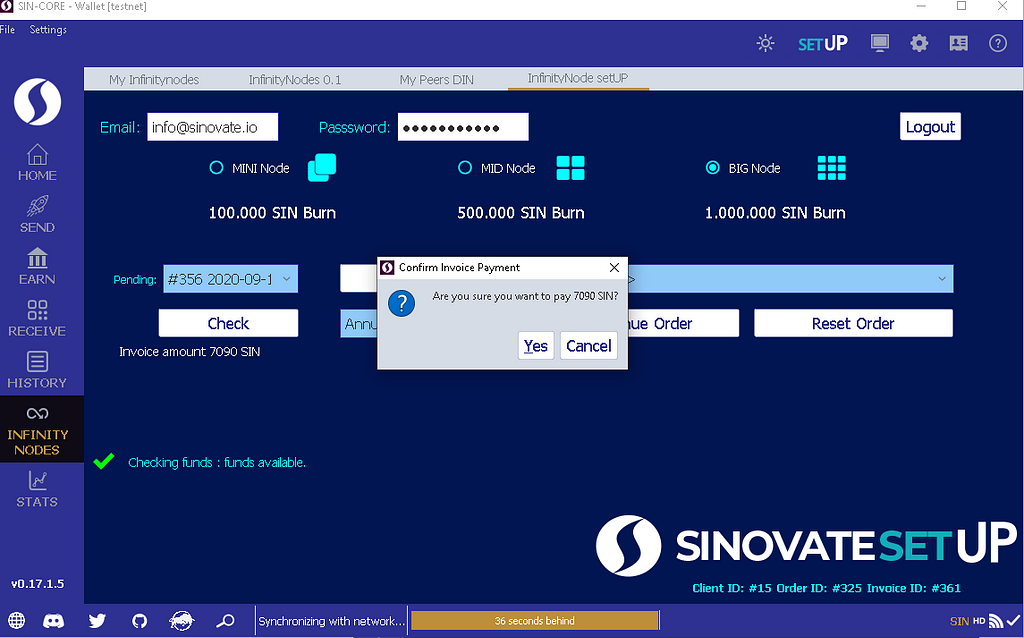
5. Click “Place Order”and Confirm your Invoice Payment by clicking “Yes.” Please ensure that you have the required additional SIN coins within your wallet balance to process the VPS (Virtual Private Server) rental fee. Please note that this will vary depending on the payment plan selected.
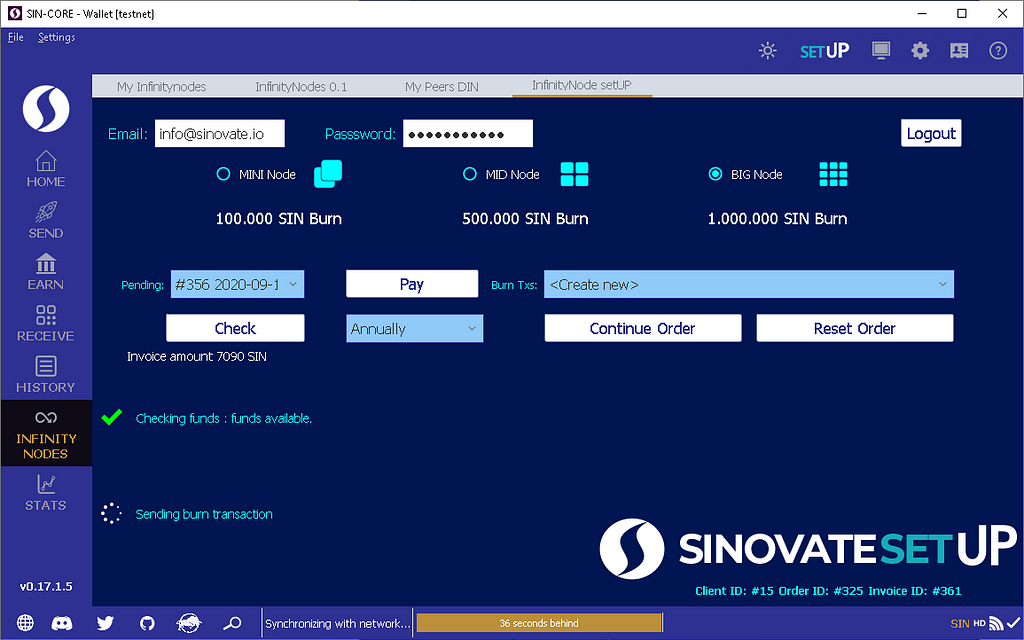
SINOVATE setUP is now complete. Depending on block confirmation speed, invoice payment, and the SIN coin burning process will automatically take between 3 and 10 minutes.
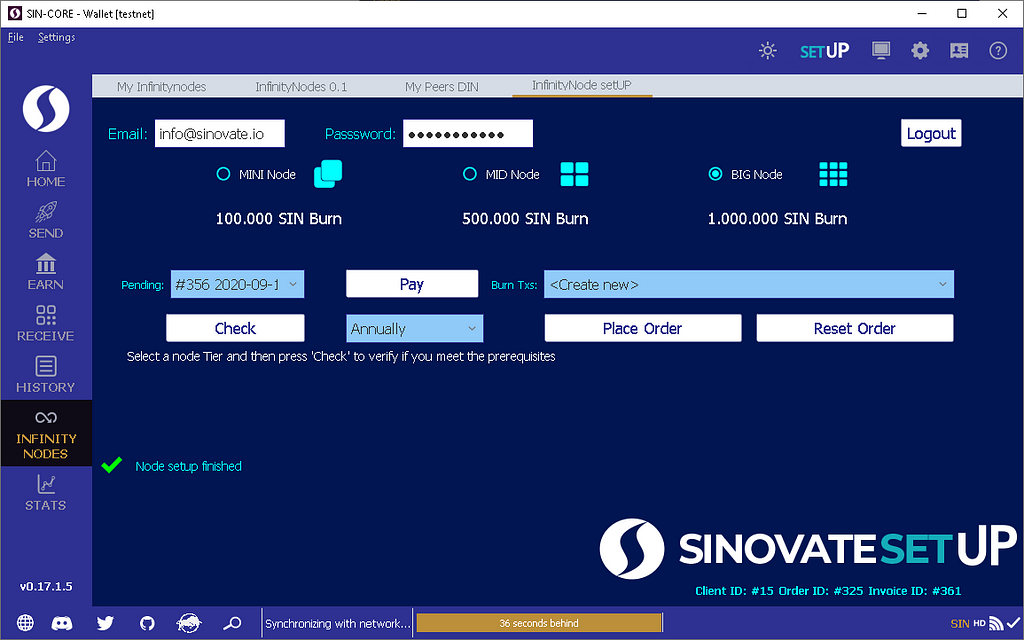
It really is that simple. In just a few short clicks, would-be network participants will earn considerable passive income for up to a year. For community members who have previously set up an infinity node, SINOVATE setUP provides the perfect opportunity to reassess your VPS needs at a fraction of the cost.
In-wallet one-click infinity node cold hosting will be available as soon as the network upgrade initiates. As always, the SIN team remains on standby to address any queries.
Conclusion
The Star Cradle Public Testnet marks the final step towards the AURORA Mainnet launch. During the two-week testing phase, the SINOVATE community will be afforded the opportunity to be rewarded for submitting undetected bugs found within the Deterministic Infinity Node codebase. DIN 1.0 is the first of its kind and will enable 100% fair distribution of deterministic infinity node rewards forever. DIN 1.0 offers substantial advantages over the existing SINOVATE protocol, including Dash legacy masternode code removal, instant synchronization, very low CPU utilization, on-chain rapid communication, and vastly improved stability and security.
The testnet phase is an imperative measure being taken to ensure that the DIN 1.0 codebase functions flawlessly prior to the official release. SINOVATE aims to redefine the blockchain space, and DIN 1.0 supports us in our journey to achieve this. Stay tuned for further developments as and when they happen via our discord and telegram channels. Thank you for your brilliant support.
Website Discord . Telegram . Bitcointalk . Twitter . Facebook .Linkedin. Team.YouTube.Reddit.Instagram.
Author: Amit Kaushal
Recent Comments